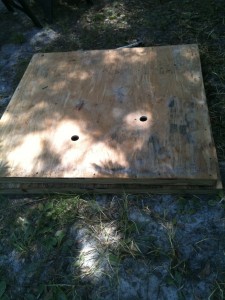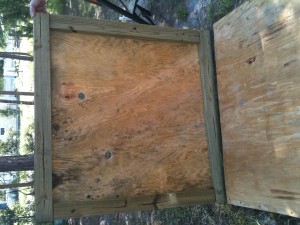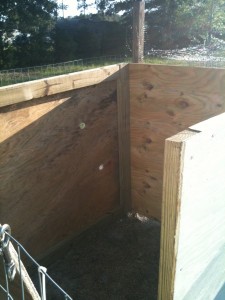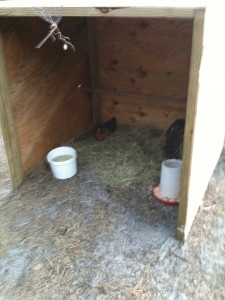OMG, I love waking up in the morning to hear little peeping coming from my incubator.
Yesterday morning, I heard peeping and found a black little Silkie chick standing in the incubator. It is amazing to me that a chick can peck its way out of the shell and be walking around the next morning. I always check the eggs just before I go to bed and there wasn’t even a chip or crack in any of the eggs.
Then this morning, I heard peeping again. Much to my delight, two baby chicks. The dark one was up and trying to walk and was actually pretty dry looking. The little grey one was still trying to get up on its feet and still a little damp looking. They fluff out so quickly. The dark one I put into the bath tub with the other four chicks that have hatched out in the last week or so. The little grey one I will keep under a heat lamp by itself for a few more hours. She just looks like she wants to sleep.
I call all my chicks “she” from the time they are hatched. I like to think I am speaking it into existence. Hens are easier to sell and of course, there is the whole egg thing. Not much production from the rooster. As my husband so eloquently put it,” the hens lay the eggs and the roosters lay the hens. ” So unless you want fertilized eggs, there isn’t much use for the rooster. And yes, the chickens do lay eggs without a rooster.
I do feel the rooster protects the hens. My neighbor said there was a stray cat in my yard the other day looking like he wanted chicken for dinner. He said the rooster charged the cat a number of times and the cat left the premises. I wish I could have seen that.
The rooster is also frequently more colorful than the hen and of course, who doesn’t love the sound of a rooster at 5am. lol
If you look at the website backyardchickens.com you will see I am not the only person addicted to chickens or hatching out chicks. That website has been a wealth of knowledge for me.
Well, I have three more eggs in my incubator that should hatch in the next day or so and my second incubator is loaded down with eggs but they won’t start hatching until the end of the month. Oh yeah, don’t wash your eggs if you want to hatch them. There is this protective “boom” on the egg that you don’t want to wash away.
Leah, a fellow chicken raiser, showed me a great system for hatching eggs. She uses two incubators. One incubator has the egg turner in it and the other does not.
![IMG_0158[1]](http://www.mychickentales.com/wp-content/uploads/IMG_01581-e1310727096151-225x300.jpg) I write the date I put the egg into the incubator and I know 21 days later I will have a chick if all goes well. I remove the eggs as each egg reaches the 18th day and put it into the second incubator to hatch. You just lie the egg down and leave it to hatch now.
I write the date I put the egg into the incubator and I know 21 days later I will have a chick if all goes well. I remove the eggs as each egg reaches the 18th day and put it into the second incubator to hatch. You just lie the egg down and leave it to hatch now.
Don’t forget to set the incubator up 24 to 48 hours ahead of your date you intend to put eggs in it. You need to get your temperature and humidity correct before adding eggs. So, I don’t get the second incubator ready until day 16. That gives me two days to make sure the incubator is working correctly. And please go buy a hydrogrometer (I think that is what it is called) to check your humidity and temp. You can see it in the next picture. I got mine at Walmart for about 6 bucks, I think.
![IMG_0159[1]](http://www.mychickentales.com/wp-content/uploads/IMG_01591-e1310727216955-225x300.jpg) So let’s say its day 18, and four of the eggs need to go into the second incubator. You put them in the second incubator and they will hatch there in three days. The next day, you have three eggs that need to go into the second incubator. QUICKLY, open the incubator and put the eggs in. I say quickly because once the eggs reach the 18th day, they should go into “lock down.” That means you don’t turn the eggs and you normally would not open the lid.
So let’s say its day 18, and four of the eggs need to go into the second incubator. You put them in the second incubator and they will hatch there in three days. The next day, you have three eggs that need to go into the second incubator. QUICKLY, open the incubator and put the eggs in. I say quickly because once the eggs reach the 18th day, they should go into “lock down.” That means you don’t turn the eggs and you normally would not open the lid.
Because I do not get forty eggs in one day, I use this system and it works fine for me. Just don’t have the second incubator open any longer than you must. You might have to add more water and you need to add more eggs as the 18th day arrives.
Once the egg hatches and the chick emerges, leave her in there. Let her dry some and get her walking legs though wobbly they will be. I have read you leave them in the incubator after hatched for 24 hours. Doesn’t happen for me. I am so excited. Again, I quickly grab the baby chick and the shell and remove them to be put under a heat lamp with the temperature already at 100 degrees. I have a themometer lying in the bed where the new chick is will be so I am sure the temp is not too hot or too cold.
![IMG_0161[1]](http://www.mychickentales.com/wp-content/uploads/IMG_01611-e1310726711174-225x300.jpg) This box is about a 10×10 inch with a folded t-shirt in it. She will stay in it until I see she is walking around and pretty much fluffed out…usually a matter of hours. The heat lamp is red. This is the little grey chick hatched this morning.
This box is about a 10×10 inch with a folded t-shirt in it. She will stay in it until I see she is walking around and pretty much fluffed out…usually a matter of hours. The heat lamp is red. This is the little grey chick hatched this morning.
I use stained t-shirts or old towels for the bedding. Of course, I have washed them and they are clean. I think the babies can get better footing on the t-shirts and get up and going faster. I have seen other people use plastic containers with wood shavings. Slippery to me and I think I read you shouldn’t use wood shavings. Chicks eat anything.
![IMG_0162[1]](http://www.mychickentales.com/wp-content/uploads/IMG_01621-e1310726928155-225x300.jpg) These are chicks in the bath tub under the red heat lamp. Chicks needs to have 100 degree temperature for the first two weeks. The little chick at the bottom of the picture is the dark chick that hatched out this morning.
These are chicks in the bath tub under the red heat lamp. Chicks needs to have 100 degree temperature for the first two weeks. The little chick at the bottom of the picture is the dark chick that hatched out this morning.
Your chicks will not need food or water for three days but I always have it in the chick’s yard/tub/box waiting for them to get the urge. The yellow yoke was the baby’s food and water and it was absorbed into the chick thru the rectum area. That is what keeps them satisfied for a couple days. That is why chicken wholesalers can send baby chicks thru the mail when they are one day old.
I hope the things I tell you are informative. I really enjoy my chickens as you can probably tell. It really gives me something to look forward to each morning after I get my hubby off to work. As soon as it is daylight, I am outside feeding my chickens and seeing that all of them made it thru the night. I have a couple of broody hens right now and I soon will be checking them daily to see if any new baby chicks have hatched.
My chicken yard looks rather red-neck right now but I have lots of plans to make my chicken yard/houses look like a nice neighborhood. I am going to put a privacy fence around their yard, too. It is fun for me to make drawings and make plans for the future for their surroundings.
Maybe it is the motherly side of me or the creative side of me or the control freak part of me that makes me enjoy this life so much. I am looking forward to the fall when we will prepare our soil for our first garden, if all goes well. Vegetable seeds are so cheap and any extra food we grow and don’t eat will go to our relatives first and then the chickens.
This is indeed, a quiet and peaceable life. I love it.
![IMG_0150[1]](http://www.mychickentales.com/wp-content/uploads/IMG_01501-e1310597742701-225x300.jpg)
![IMG_0149[1]](http://www.mychickentales.com/wp-content/uploads/IMG_014911-e1310598020554-225x300.jpg)
![IMG_0155[1]](http://www.mychickentales.com/wp-content/uploads/IMG_01551-e1310599385787-225x300.jpg)
![IMG_0156[1]](http://www.mychickentales.com/wp-content/uploads/IMG_01561-e1310599514944-225x300.jpg)
![IMG_0157[1]](http://www.mychickentales.com/wp-content/uploads/IMG_01571-e1310599715727-225x300.jpg)
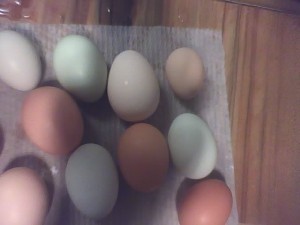
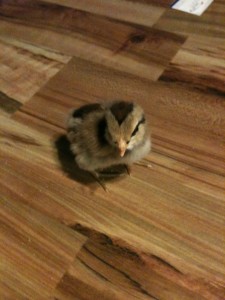
![IMG_0154[1]](http://www.mychickentales.com/wp-content/uploads/IMG_01541-e1310427736397-225x300.jpg)
![IMG_0029[1]](http://www.mychickentales.com/wp-content/uploads/IMG_00291-300x225.jpg)
![IMG_0144[1]](http://www.mychickentales.com/wp-content/uploads/IMG_014412-e1310428438980-225x300.jpg)
![IMG_0104[1]](http://www.mychickentales.com/wp-content/uploads/IMG_01041-e1310428953907-225x300.jpg)
![IMG_0107[1]](http://www.mychickentales.com/wp-content/uploads/IMG_01071-e1310429518201-225x300.jpg)
![IMG_0136[1]](http://www.mychickentales.com/wp-content/uploads/IMG_013611-e1310429919752-225x300.jpg)
![IMG_0142[1]](http://www.mychickentales.com/wp-content/uploads/IMG_01421-e1310430131325-225x300.jpg)
![IMG_0146[1]](http://www.mychickentales.com/wp-content/uploads/IMG_01461-e1310430434893-225x300.jpg)
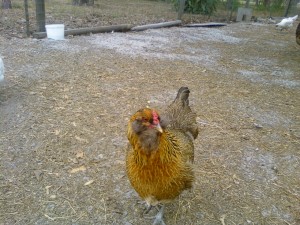
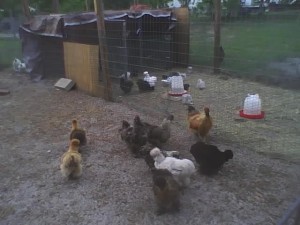
![IMG_0124[1]](http://www.mychickentales.com/wp-content/uploads/IMG_012411-e1310431359624-225x300.jpg)
